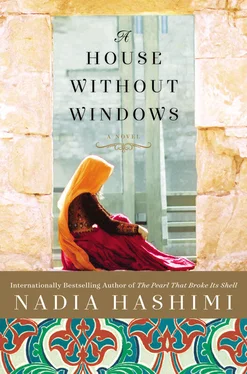She was on her feet, her back to him. It was the end of their conversation. Najeeb felt his chest tighten to think that this very moment she would walk out of his office and never return. What did she think of him? He still couldn’t tell by the way she spoke.
Gulnaz paused, her hand resting on the door frame. Her finger tapped once, twice before she turned around and asked one more casual question.
“By the way, Qazi- sahib . It would be rude of me to leave without asking. How is your younger brother doing these days?”
WHEN BASIR WAS TEN YEARS OLD, HE MADE AN IMPORTANT discovery — the adults he’d always trusted could lie. In fact, it was not as much of a possibility as it was a proclivity. They were just as dishonest about small, insignificant details as they were about life-changing truths. When Basir detected the first lie, he vowed to keep his eyes open for a second. By the time he noticed the third and fourth deceit, he decided it was impossible to trust much of anything that came out of the mouths of adults.
Kaka Mateen claimed he’d gone to fight in the war, but he’d actually run off to Iran. Khala Shokria swore she’d made fried potato flatbreads just for him, but he knew she’d bought them from the street vendor. His mother claimed to love all her children equally, but Basir could see that Shabnam claimed more of her heart than the rest of them.
Basir didn’t point out the lies. He knew better than to contradict his relatives. He simply nodded and tightened his lips so nothing disrespectful would slip out.
This decision to distrust complicated Basir’s life. Everything that was told to him had to be tested. Sometimes he wished he could be more accepting, but when he sensed holes in a story, he could not rest until he’d put his eye to each tiny opening and made sure he saw all that there was to see. Truth became an obsession, and vetting became a compulsion. That compulsion was what brought him to keep a secret box within the grove of trees in Ama Tamina and Kaka Fareed’s small yard.
Months before he’d walked into his house to find his father’s head cracked open, Basir had heard from a friend that scorpion mothers ate their young. For Basir, who had seen dogs nuzzle their pups and mother hens coddling newborn chicks, this seemed unnatural. Scorpions were admittedly nasty creatures but that didn’t quite explain why they would disrupt the God-ordained order of things. Mothers spent their energy creating and caring for babies. Even scorpion mothers shouldn’t consume their offspring. It was backward and couldn’t be true.
Basir set out to unearth the truth for himself.
After nine days of turning over rocks, he found a pregnant, tawny-colored scorpion and nudged her into a box. Her tail curled up as she darted left and right, but there was nowhere to go. Basir had put a heavy rock over the top of the box so she wouldn’t be able to escape and kept it behind the outhouse of his home, where no one in his family would dare to look. It was dangerous, he knew, but his curiosity demanded he take the risk.
He threw scraps of food into the box every couple of days and used a long stick to poke at the scorpion from a safe distance. She hated him for keeping her captive. Basir could see it in the poise of her tail, the vindictive posture she assumed when he lifted the box cover.
She would kill him if he gave her the slightest chance. But her own babies? Basir was still skeptical.
Day after day, he would check on his captive. Every time he was done with his observations, he would shut the lid of the box and replace the heavy stone that kept the scorpion trapped within. The box itself lay well out of sight, in an ignored corner of the lot. Still, its presence made him nervous and he wished the insect would hurry her babies along so he could bring his experiment to a close.
When he’d walked into their courtyard that day, Basir had thought for the shortest of seconds that his scorpion might have been responsible for the gory scene. It was as if he’d half expected that his need to test something as dangerous as a scorpion would, one day, cost him the life of someone in his family. Basir walked into his home and smelled death and destruction that day. He’d nearly fallen to his knees with the weight of it, believing it to be his own doing — until he’d seen the hatchet.
When Basir and his sisters had been sent to live with Ama Tamina, Basir’s scorpion was still in her box.
Basir walked out of Ama Tamina’s house one evening and without explicitly planning to, his feet plodded their way back to his family’s home. It was nearly dark, and no one noticed the slight young boy slip through his front gate.
He stood in the front yard, motionless. He half expected his mother or father to emerge from the doorway of the house, sipping tea and chastising him for being out after dark. No one came out. Basir stepped over the threshold and was met with the pungent smell of rotting onions. It felt oddly comforting to a boy who was likely expecting to detect something far worse. His mother’s brass mortar and pestle lay on a square of newspaper, a small mound of cardamom beside it. Rima’s pink knit blanket lay crumpled by the wall.
Basir took a few more steps into the home. For years, he’d been told to stay within these walls, scolded for staying away too long in the afternoons. Now it felt wrong to stand here. He peered into the small room his parents had once shared. His father’s wool hat and scarf lay on the dresser that was missing one knob. Their sleeping cushions lay on the cold floor, their pillows marking their places like tombstones.
He stared at the space as if it were an old photograph. Why did they decide to live away from the rest of the family? Basir had heard his parents argue. He’d heard his father’s rage and seen the way his mother had reeled from his blows. Basir had believed his mother to be meek but devoted, exasperating but well-meaning. His father had a violent temper, but why couldn’t his mother, after all their years of marriage, avoid triggering his fury? Had his cowed mother finally had enough? Had she stood her ground in one grand gesture of defiance?
Basir hadn’t really known his parents all that well, he admitted to himself.
He stepped through the back door and into the yard, two meters away from where his father’s body had lain, the earth still darkened where his head had been. The neglected pot of peppermint stalks and the chili pepper plant had dried, leaves curled and browned and scattered in half circles at their bases. The dried red peppers looked like tiny, crinkled daggers. His mother’s rosebush, in the corner of the yard, was the sole survivor. It seemed oblivious to all that had transpired in its presence.
Cocking his ear to the sky, Basir strained to hear anything. There was only the distant sound of the neighbor’s television. He imagined them watching their favorite programs, drinking tea, snacking on almonds, and playing cards — as if nothing had happened. Had they heard anything that day? Did they know more about his family’s undoing than he did?
Basir moved toward the outhouse, careful the soles of his shoes did not tread where his father had fallen. Tucked behind the back wall of the outhouse was the small box. Basir removed the stone anchoring its lid. He lifted the box and listened for signs of life.
All was still.
He took the box to the center of the courtyard where the glow of a full moon fell upon it. He lifted the top and gasped.
The mother scorpion was very much alive, her back heavy with baby scorplings, two dozen pale beetle-ish creatures. Basir broke off a twig from the rosebush and poked at the mother. Her pincers snapped and she moved to the side of the box, her tail curled in readiness.
Читать дальше











